

The sugar conspiracy. Robert Lustig is a paediatric endocrinologist at the University of California who specialises in the treatment of childhood obesity.

A 90-minute talk he gave in 2009, titled Sugar: The Bitter Truth, has now been viewed more than six million times on YouTube. In it, Lustig argues forcefully that fructose, a form of sugar ubiquitous in modern diets, is a “poison” culpable for America’s obesity epidemic. A year or so before the video was posted, Lustig gave a similar talk to a conference of biochemists in Adelaide, Australia. Afterwards, a scientist in the audience approached him. Surely, the man said, you’ve read Yudkin. “If only a small fraction of what we know about the effects of sugar were to be revealed in relation to any other material used as a food additive,” wrote Yudkin, “that material would promptly be banned.” Untitled. Experts: Eat More Fat. Credit: Iain Bagwell / Getty Images For more than half a century, the conventional wisdom among nutritionists and public health officials was that fat is dietary enemy number one – the leading cause of obesity and heart disease.
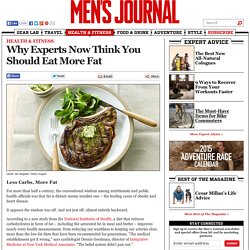
It appears the wisdom was off. And not just off. Almost entirely backward. The effect of a high-egg diet on cardiovascular risk factors in people with type 2 diabetes: the Diabetes and Egg (DIABEGG) study—a 3-mo randomized controlled trial. 23 Studies on Low-Carb and Low-Fat Diets - Time to Retire The Fad. Overall, the low-carb diet had significantly more beneficial effects on weight and key biomarkers in this group of severely obese individuals.
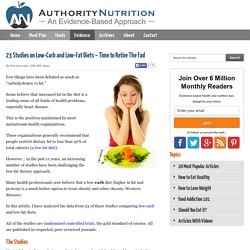
Details: 30 overweight adolescents were randomized to two groups, a low-carb diet group and a low-fat diet group. This study went on for 12 weeks. Neither group was instructed to restrict calories. WSJ: The Last Anti-Fat Crusaders - DietDoctor.com. Busting common nutrition myths. Why A High-Fat Diet is Healthy and Safe. Welcome!

If you want to lose weight, gain muscle, increase energy levels or just generally look and feel healthier you've come to the right place. How did we come to believe saturated fat and cholesterol are bad for us? - The Eating Academy. There aren’t too many topics that really get me riled up anymore.
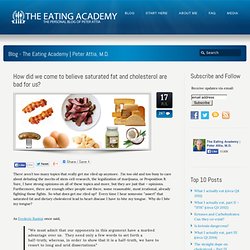
I’m too old and too busy to care about debating the merits of stem cell research, the legalization of marijuana, or Proposition 8. Sure, I have strong opinions on all of these topics and more, but they are just that – opinions. Furthermore, there are enough other people out there, some reasonable, most irrational, already fighting those fights. The Lipid Hypothesis. Lipids are a biological term for fats, and Hypothesis means a theory.
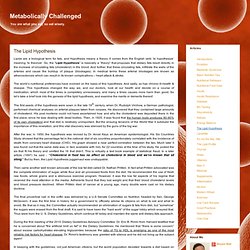
It comes from the English verb ‘to hypothesize’ meaning ‘to theorize’. So, the “Lipid Hypothesis” is basically a “theory” that proposes that dietary fats result directly in the increase of circulating fats (cholesterol) in the blood. And further, that these circulating fats, infiltrate the walls of the arteries and cause the buildup of plaque (blockages). In medical terms these arterial blockages are known as atherosclerosis which can result in its known complications – heart attack & stroke.
Ending the War on Fat.pdf. July/August 2014 by San Francisco Medical Society. Sweden Becomes First Western Nation to Reject Low-fat Diet Dogma in Favor of Low-carb High-fat Nutrition. Swedish meatballs now “OK” Brian Shilhavy Health Impact News Editor Sweden has become the first Western nation to develop national dietary guidelines that reject the popular low-fat diet dogma in favor of low-carb high-fat nutrition advice.
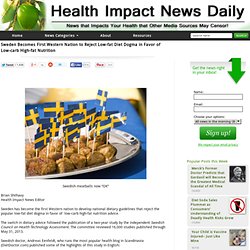
The switch in dietary advice followed the publication of a two-year study by the independent Swedish Council on Health Technology Assessment. The committee reviewed 16,000 studies published through May 31, 2013. Swedish doctor, Andreas Eenfeldt, who runs the most popular health blog in Scandinavia (DietDoctor.com) published some of the highlights of this study in English: 23 Studies on Low-Carb and Low-Fat Diets - Time to Retire The Fad. Low-Carb, Higher-Fat Diets Add No Arterial Health Risks to Obese People Seeking to Lose Weight - 06/01/2011. "Overweight and obese people appear to really have options when choosing a weight-loss program, including a low-carb diet, and even if it means eating more fat," says the studies' lead investigator exercise physiologist Kerry Stewart, Ed.D.
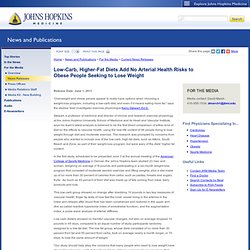
Stewart, a professor of medicine and director of clinical and research exercise physiology at the Johns Hopkins University School of Medicine and its Heart and Vascular Institute, says his team's latest analysis is believed to be the first direct comparison of either kind of diet on the effects to vascular health, using the real-life context of 46 people trying to lose weight through diet and moderate exercise. The Fat Question: Why fat doesn’t make you fat. There’s a big ol’ myth out there that stubbornly refuses to die.
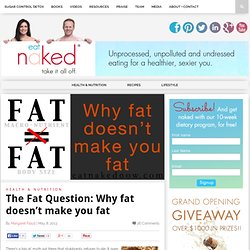
It goes something like this: eating fat makes you fat. From a basic caloric standpoint, this appears to make sense. Fat contains 9 calories per gram, whereas carbohydrates and proteins contain 4 calories per gram. If calories were the only thing to consider, it would stand to reason that if you eat fat, you’re going to gain weight because of the higher caloric load. Recipe: How to Make Your Coffee Bulletproof®…And Your Morning Too. Bulletproof Coffee is not your average latte.

It’s a high-performance drink that has a massive impact on your energy and cognitive function. Bulletproof Coffee has helped everyone from driven CEOs to professional athletes to busy parents increase their energy so they can do more of what fulfills them. Looking to buy Bulletproof Coffee? Rethinking Fat: The Case For Adding Some Into Your Diet : The Salt. Hide captionNutrition researchers are reaching a new consensus: Cut back on all those refined carbs. And remember that some fat is good. Stacy Spensley/Flickr Nutrition researchers are reaching a new consensus: Cut back on all those refined carbs. Why We Got Fatter During The Fat-Free Food Boom : The Salt. If you want to trace Americans' fear of fat, the place to start is the U.S. Senate, during the steamy days of July 1976. That's when Sen. George McGovern called a hearing to raise attention to the links between diet and disease. And what was the urgency? The economy was booming, and many Americans were living high on the hog.
Butter Is Back. Julia Child, goddess of fat, is beaming somewhere. Butter is back, and when you’re looking for a few chunks of pork for a stew, you can resume searching for the best pieces — the ones with the most fat. Eventually, your friends will stop glaring at you as if you’re trying to kill them. That the worm is turning became increasingly evident a couple of weeks ago, when a meta-analysis published in the journal Annals of Internal Medicine found that there’s just no evidence to support the notion that saturated fat increases the risk of heart disease.
(In fact, there’s some evidence that a lack of saturated fat may be damaging.) The researchers looked at 72 different studies and, as usual, said more work — including more clinical studies — is needed. Study Questions Fat and Heart Disease Link. Smokey Bones Bar & Fire Grill/PRNewsFotoA new study questions the relationship between heart disease and saturated fat. Many of us have long been told that saturated fat, the type found in meat, butter and cheese, causes heart disease. But a large and exhaustive new analysis by a team of international scientists found no evidence that eating saturated fat increased heart attacks and other cardiac events. The new findings are part of a growing body of research that has challenged the accepted wisdom that saturated fat is inherently bad for you and will continue the debate about what foods are best to eat. For decades, health officials have urged the public to avoid saturated fat as much as possible, saying it should be replaced with the unsaturated fats in foods like nuts, fish, seeds and vegetable oils.
“My take on this would be that it’s not saturated fat that we should worry about” in our diets, said Dr. But Dr. Are the Government's Dietary Guidelines Making Us Obese? Margie KingActivist Post Since the early 1980s the USDA Dietary Guidelines for Americans have urged trusting Americans to eat a low-fat high-carbohydrate diet for their health and weight control. Since then, there has been an alarming increase in chronic diseases such as cancer and diabetes. In addition, obesity rates have shot up to 30%, and more than 70% of Americans are overweight. Can the dietary guidelines be to blame? Many experts believe that the USDA and other government agencies have stubbornly disregarded the science and continued a 30-year long nutrition experiment on Americans that has had disastrous results.
Nutrition experts from The Healthy Nation Coalition, which includes the Weston A. What's wrong with the government's nutrition advice? Scientists Fail To Find A Link Between Saturated Fat And Heart Disease. ‘Fat is good’: the message from a man who swapped sugar for bacon and eggs - Family News & Advice. Donal O’Neill’s father, Kevin, had hardly put on any weight since the 1960s when he won two All-Ireland football medals with Down. He was always fit and never drank alcohol but in January 2010 he had a heart attack. Though he pulled through, Donal, who founded the Gaelic Players’ Association in 1999, was perplexed. Saturated fat is not the major issue. Let’s bust the myth of its role in heart disease Scientists universally accept that trans fats—found in many fast foods, bakery products, and margarines—increase the risk of cardiovascular disease through inflammatory processes.1 But “saturated fat” is another story.
How to Optimize Your Omega-6 to Omega-3 Ratio. Today, most people are eating way too many Omega-6 fatty acids. At the same time, consumption of animal foods high in Omega-3 is the lowest it has ever been. A distorted ratio of these polyunsaturated fatty acids may be one of the most damaging aspects of the Western diet. Dr. Oz: Low-carb, high-fat diet can reverse Alzheimer's, diabetes, ADHD - National Celebrity Fitness and Health. Dr.
Oz usually encourages his audience to eat lots of whole-grain wheat, but neurologist David Perlmutter says a high-carb, grain-heavy diet destroys the brain and fuels Alzheimer's disease. Internet Scientific Publications. 9 Lies About Fat That Destroyed The World's Health. Fat Head: The WEBSITE. Fat Head: The MOVIE. Try lard, the comeback fat, in baked goods and salad dressings. When Roberto Copa Matos was growing up in Ranchuelo, a small town in central Cuba, he went with his grandmother on weekends to the bakery where she worked. He remembers peering into “big tubs of lard, white as snow.” Eating fat is good for you: Doctors change their minds after 40 years. Cardiologist Dr Aseem Malhotra says the obsession with a low-fat diet has “paradoxically increased” the risk of heart disease.
LCHF. LCHF. David Mendosa On Low-Carb High-Fat Diets for Type 2 Diabetes. David Mendosa suggests that all type 2 diabetics can manage their illness without drugs. I’m not quite that optimistic, but probably a majority can, if they have the knowledge, discipline, and willpower. Dr. Oz: Low-carb, high-fat diet can reverse Alzheimer's, diabetes, ADHD - National Celebrity Fitness and Health. Frequently Asked Questions About The Paleo Diet. Q. How does the Paleo Diet work? LCHF for Beginners.